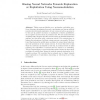Free Online Productivity Tools
i2Speak
i2Symbol
i2OCR
iTex2Img
iWeb2Print
iWeb2Shot
i2Type
iPdf2Split
iPdf2Merge
i2Bopomofo
i2Arabic
i2Style
i2Image
i2PDF
iLatex2Rtf
Sci2ools
ICANN
2007
Springer
2007
Springer
Biasing Neural Networks Towards Exploration or Exploitation Using Neuromodulation
Abstract. Taking neuromodulation as a mechanism underlying emotions, this paper investigates how such a mechanism can bias an artificial neural network towards exploration of new courses of action, as seems to be the case in positive emotions, or exploitation of known possibilities, as in negative emotions such as predatory fear. We use neural networks of spiking leaky integrate-and-fire neurons acting as minimal disturbance systems, and test them with continuous actions. The networks have to balance the activations of all their output neurons concurrently. We have found that having the middle layer modulate the output layer helps balance the activations of the output neurons. A second discovery is that when the network is modulated in this way, it performs better at tasks requiring the exploitation of actions that are found to be rewarding. This is complementary to previous findings where having the input layer modulate the middle layer biases the network towards exploration of alt...
| Added | 08 Jun 2010 |
| Updated | 08 Jun 2010 |
| Type | Conference |
| Year | 2007 |
| Where | ICANN |
| Authors | Karla Parussel, Lola Cañamero |
Comments (0)

